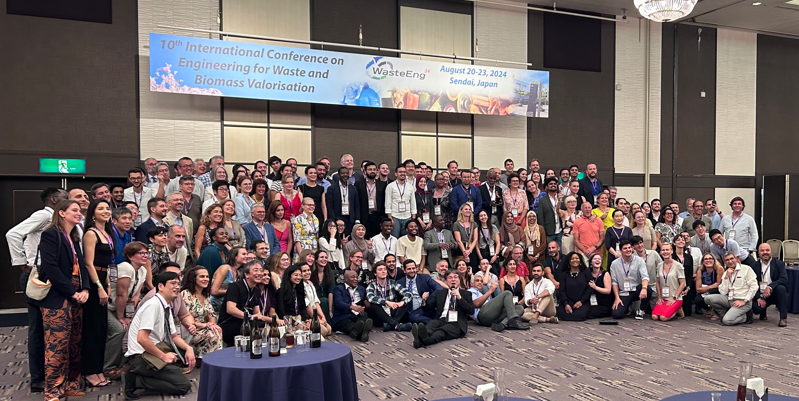
WasteEng2024 participants pose for a group photo at the Gala Dinner, held at Sendai Kokusai Hotel (Sendai, JAPAN).
The 10th International Conference on Engineering for Waste and Biomass Valorisation, known colloquially as WasteEng2024, was held at Tohoku University’s Kawauchi Campus in Sendai, Japan, from August 20-23, 2024. This conference marked a significant milestone in the field, celebrating 20 years of research and innovation aimed at transforming waste and biomass into valuable resources, driving the global transition towards sustainability.
As part of our ongoing efforts to promote and support international conferences in Sendai, the Sendai Convention Bureau had the pleasure of interviewing one of the key figures behind this event: Professor Ange Nzihou, founder and chair of the WasteEng Conference series, Distinguished Professor of Chemical Engineering at IMT Mines Albi, RAPSODEE, CNRS in France, and Fulbright Fellow and Visiting Professor at Princeton University, USA. Prof. Nzihou shared insights into the significance of the conference, the reasons for choosing Sendai as the host city, and his reflections on the event.
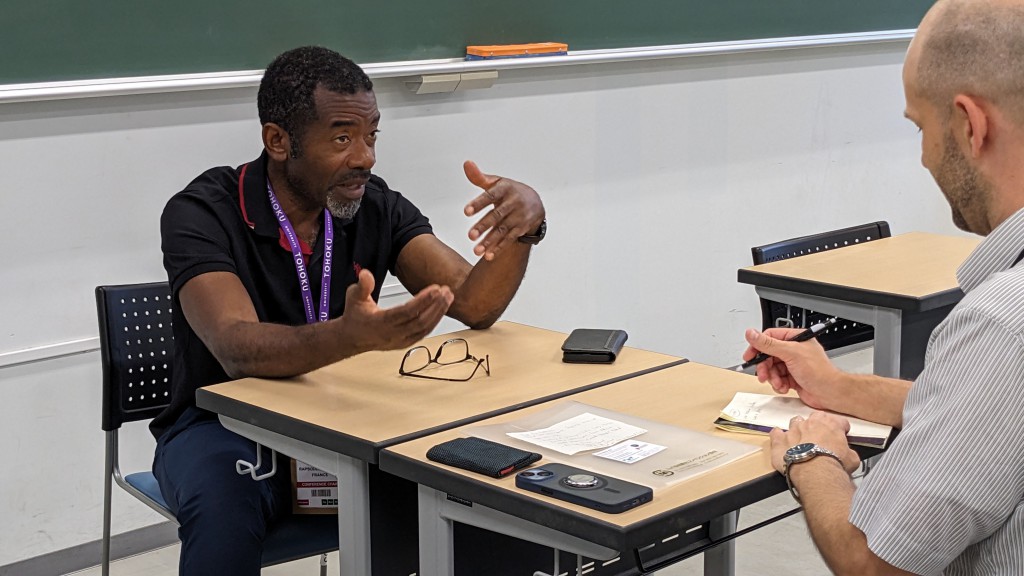
Founder and chair of the WasteEng Conference series Professor Ange Nzihou, being interviewed by Sendai Convention Bureau’s Justin Velgus.
Prof. Nzihou explained that selecting Sendai as the host city for WasteEng2024 was a decision driven by multiple factors. “The conference has traditionally been held in Europe, but as sustainability and waste valorization are global concerns, we wanted to expand our international reach. Japan, with its safety, security, and ease of travel, was an ideal choice,” he said. “Sendai, in particular, stood out for its accessibility, compactness, and calm atmosphere, as well as its reputation as a leader in the development of cutting-edge recycling research at Tohoku University.”
The choice of Sendai also offered participants the opportunity to experience Japan’s rich culture and natural beauty. Japan’s allure, from its stunning landscapes to its delicious food, made it an attractive destination for attendees. “Everyone wants to visit Japan!”, Prof. Nzihou remarked with a smile.
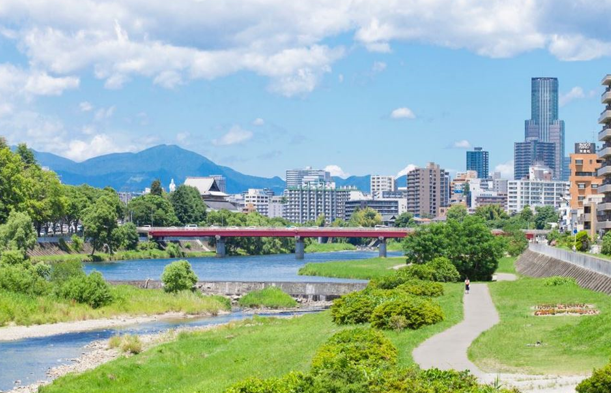
“City of Trees” Sendai offers both rich nature and urban greenery along with the conveniences of a large, modern city.
WasteEng2024 brought together around 300 participants from 45 countries, with an impressive 90% of attendees coming from overseas. This diverse group included a significant number of students, a testament to the organization’s commitment to nurturing the next generation of researchers. “One-third of our participants were students,” he noted. “We offer them a special discount rate to ensure they can gain the knowledge and inspiration needed to drive future innovations in this field.”
Catering to the diverse needs of international participants posed unique challenges, particularly in terms of dietary requirements. For example, Halal options for the bento lunches for Muslim attendees were prepared in close collaboration between the local organizers and catering services. Attendees seemed happy with the selection and variety, with Prof. Nzihou summarizing: “We were able to provide delicious, safe food for everyone, with clear English explanations of all menu items.”
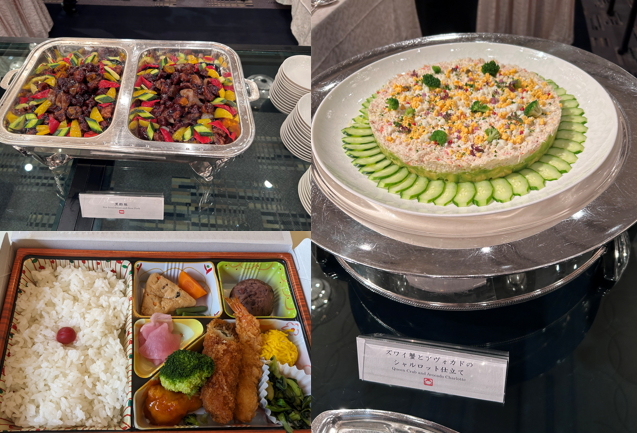
Food selections and options at both the conference site and Gala Dinner were carefully considered to accommodate various dietary needs and preferences.
The conference was packed with high-value educational lectures, workshops, and networking opportunities. Professors from Tohoku University delivered impactful talks on topics plastic recycling, including discussions on the global issue of microplastics, emphasizing the need for cleanup, reuse, and recycling which can be made more efficient through technology and practices.
One of the highlights of WasteEng2024 was the technical tour of the NanoTerasu synchrotron facility, held the day before the conference. “This facility is one of the newest ‘next generation’ synchrotrons in the world, capable of observing materials and interactions at the nano and molecular levels,” Prof. Nzihou explained. NanoTerasu is operated by the National Institutes for Quantum Science and Technology (QST), the national entity that established the facility, with the participation of the Photon Science Innovation Center, a representative organization of the regional partners, and the Japan Synchrotron Radiation Research Institute, which performs utilization promotion services based on the Law for Promotion of Public Utilization. What makes it even more special is its location—just 15 minutes by subway from Sendai Station and a short walk afterward. Usually, these facilities are much more remote. The facility is available for tours for related conferences.
The Gala Dinner, held at the downtown Sendai Kokusai Hotel, was another memorable event. Participants enjoyed a lively and interactive atmosphere, with sushi chefs preparing sushi on-demand, a sake tasting table featuring award-winning brews from Miyagi Prefecture, and a performance by the DATE Bushotai Welcome Squad, a troupe of historical performers who reenact the era of feudal lord Date Masamune. “The Gala Dinner created an environment where seasoned professors and young students could connect, share ideas, and form lasting bonds,” Prof. Nzihou said.
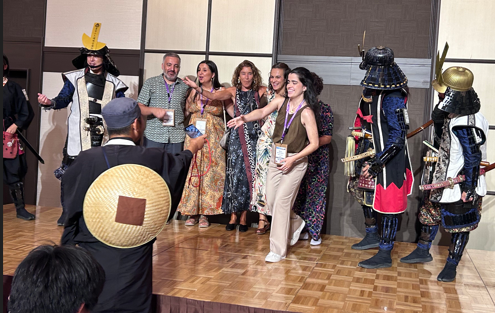
The “DATE Bushotai Welcome Squad” poses for photos with participants after their performance.
While the overall organization and execution of the conference went smoothly, Prof. Nzihou did note some areas for improvement. “One challenge we faced was the low level of English proficiency among some hotel staff,” he mentioned. “There was an incident where I locked my key card in my room, and it took about 10 minutes to resolve the issue due to communication difficulties. While the staff were very helpful and used a translation device, this is something that could be improved.”
On a more positive note, Prof. Nzihou praised the support provided by Tohoku University, the Sendai Convention Bureau, particularly the “convention supporters”. Up to three of these carefully selected and trained bilingual volunteers are dispatched as a free service to assist international conferences. They can often be found helping at registration, guiding participants to venues, and provided tourist information to participants. “The volunteers were fantastic. They were eager to use their English skills and interact with people from around the world. Our participants appreciated the local insights and recommendations they provided,” he said.
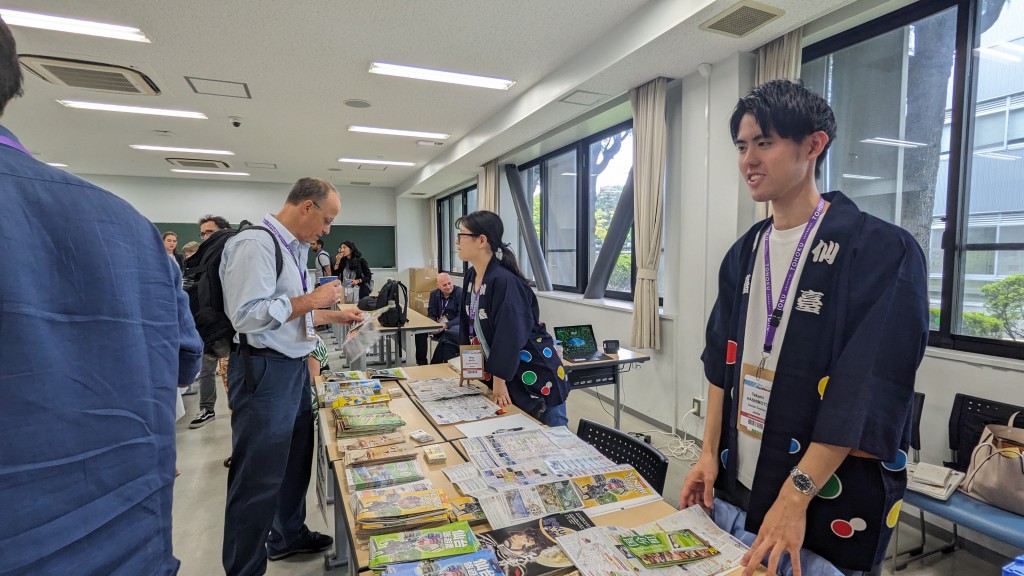
“Convention supporters” dispatched from the Sendai Convention Bureau provide WasteEng2024 participants with information and tourism pamphlets about local transportation, shopping, and restaurants.
Reflecting on the experience, Prof. Nzihou expressed his confidence in Sendai as a prime location for hosting international conferences. “Sendai offers a unique combination of accessibility, advanced research facilities, and cultural richness,” he concluded. “I would highly recommend Sendai as an ideal destination for MICE events, especially academic conferences. The success of WasteEng2024 is a testament to what this city can offer.”
As Sendai continues to develop as a leading MICE destination, the Sendai Convention Bureau remains committed to supporting and enhancing the experience of organizers and participants alike. “Arigato” to Prof. Ange Nzihou, the WasteEng2024 organizers, and all the participants for bringing this important conference to Sendai and contributing to the advancement of sustainability research worldwide
Prof. Ange Nzihou would also like to express his deepest gratitude to Dr Elsa Weiss-Hortala and Dr Javier Escudero Sanz from IMT Mines Albi, RAPSODEE, CNRS in France; Prof. Junya Kano, Prof. Toshiaki Yoshioka and Prof. Takaaki Tomai from Tohoku University for the great job done. “WasteEng2024 in Sendai has been a memorable experience and venture!”
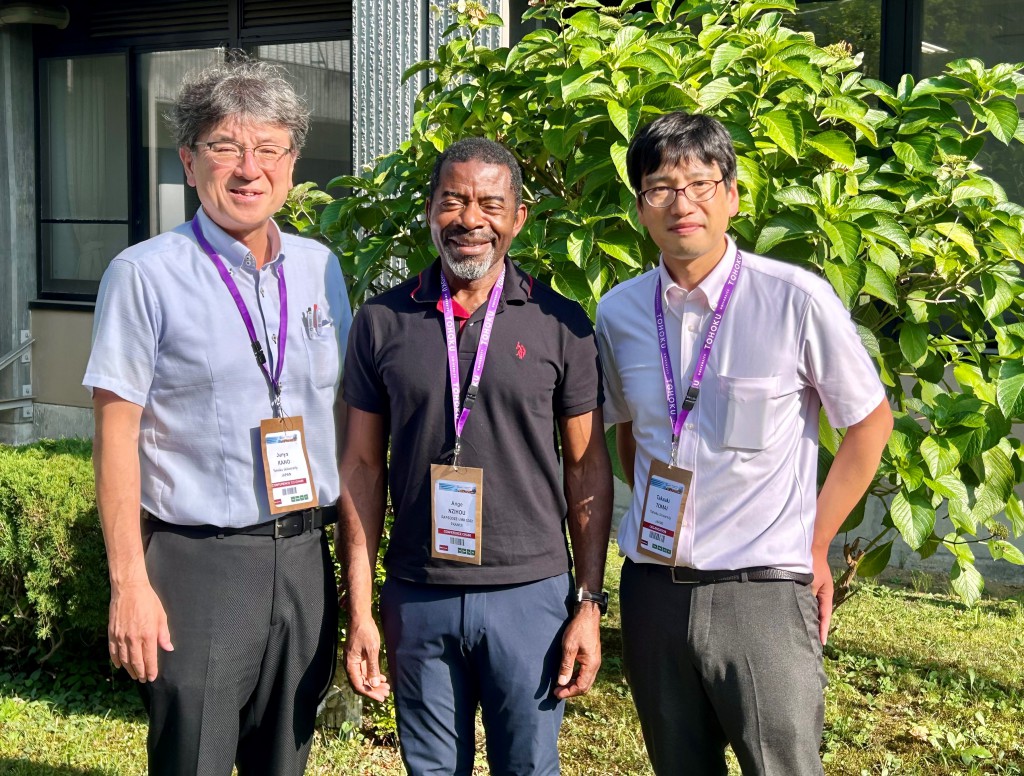
Prof. Ange Nzihou poses with local organizing committee members, Prof. Junya Kano (left) and Prof. Takaaki Tomai (right) from Tohoku University, after the successful conclusion of the conference.
 topへ
topへ